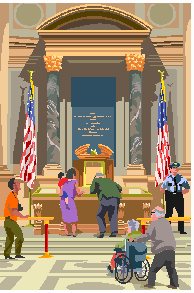 |
Connecticut Coalition For Peace and Justice |
|||
ContentsHome
|
CT CIVIL
RIGHTS DEFENSE COALITION
Remember to vote "NO!" on the Constitutional Convention question when you cast your ballot on Election Day. David Samuels Why Connecticut Should Vote Against Calling a Constitutional Convention JONATHAN B. ORLEANS The November election ballot will have a referendum question on whether a state constitutional convention to propose amendments to the Connecticut constitution should be held. As a small "D" democrat- one who wants to believe that more democracy generally leads to better government-arguably, I should be in favor of a constitutional convention. But I plan to vote against it, and I urge you to do so, too. Here's why: First, although the Connecticut constitution requires that voters be asked every 20 years whether we favor calling a constitutional convention, we don't need a constitution convention in order to amend the state constitution. The Connecticut constitution provides another, more thoughtful and deliberative procedure for amendment. A proposed amendment that is passed by a three-fourths majority of each house of the legislature, or by a simple majority of each house in two successive legislatures, may then be submitted to the statewide electorate for approval. History suggests that constitutions should not be amended lightly, and perhaps that is why this method of amending the Connecticut constitution has been used rarely. The very cumbersomeness of the procedure provides some assurance that proposed amendments to the state constitution would be carefully considered and thoroughly debated by state legislators. State legislators' debates are more likely to be informed by legal precedents, consciousness of people's constitutional rights, and the likely implications of any proposed amendment than the debates at a constitutional convention, which would be dominated by groups with narrow, special interests. Second, one of the principal goals of the organizations who are currently advocating for a constitution convention is the establishment of an initiative and referendum procedure for Connecticut voters. This strikes me as a bad idea. In states where voters can bypass the state legislature and enact laws through initiative and referendum, the majority tends to restrict the rights of minorities and to attack civil liberties, including limiting or abolishing affirmative action, limiting marriage rights to heterosexual couples, restricting women's access to abortion, crippling state funding that provides equal access to good public education, etc. Having an initiative and referendum procedure would be an invitation to impose restrictions on civil rights in Connecticut. We should oppose it. Third, the backers of a Connecticut constitutional convention have been explicit about their intentions to use the convention to propose amendments to the Connecticut constitution that would restrict our civil rights. The Family Institute of Connecticut is advocating for a constitutional convention in order to pass a proposed amendment that would define marriage as the union of a man and a woman. FIC also opposes abortion rights. The Connecticut Constitution Convention Campaign lists "immigration reform" as one of the issues a convention could address. By "immigration reform," they surely mean amending the state constitution to restrict the rights of undocumented immigrants. In short, it seems very likely that a constitutional convention would become a vehicle for a variety of anti-civil liberties proposals. Opponents of our civil rights and liberties are often better-organized,
better-financed, and more ideologically motivated than the ACLU-CT and its
allies. It is important to get the word out about the negative
implications for civil liberties of having a constitutional convention. I
acknowledge that there is a certain tension between my belief in
democratic principles and my desire to protect civil liberties. A
preference for representative democracy over direct democracy is one
solution to this tension. In any event, this is an occasion for
pragmatism. When I vote in November on the question of calling a
constitutional convention in Connecticut, I plan to vote
pragmatically-"NO"-and I urge other ACLU-CT members to do the |
